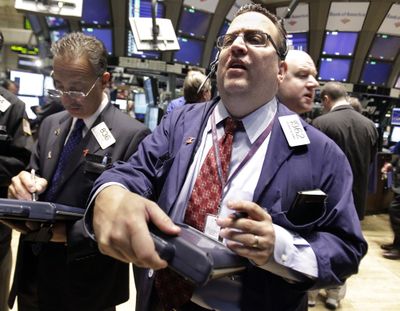Investors remain wary of financial institution stocks
Profit reports fail to convince

NEW YORK – Investors are back to worrying about banks.
Long-present unease about soured loans bubbled over on Monday after Bank of America Corp. said it set aside $13.4 billion to cover lending losses even as it posted earnings that beat expectations. Other big banks have also increased loss provisions in the past two weeks.
Financial stocks suffered some of the day’s worst declines and major market indicators tumbled more than 3 percent, including the Dow Jones industrial average, which fell 290 points.
Bank of America plunged 24.3 percent and Citigroup fell 19 percent as investors became worried that cleaning up bad loans from banks’ balance sheets may have farther to go than many had anticipated.
Joe Saluzzi, co-head of equity trading at Themis Trading LLC, said traders are now viewing bank earnings with more skepticism and believe that the better-than-expected profit reports may be disguising problems.
“They’re looking at bank numbers and are saying they are not that great,” Saluzzi said.
Even without growing anxiety about financial stocks, traders had been looking for some pullback after the Dow jumped 24 percent from 12-year lows in early March.
The renewed worries about banks’ debt problems were aggravated by news reports that their lending remains tight and that the government may swap its debt in banks for ownership stakes as its $700 billion bailout fund runs down.
Because of the central role lending plays in keeping businesses of all kinds going, investors have been hunting for signs of a recovery in banks before they get more optimistic about the broader economy.
The market has been encouraged by early indications that a government drive for lower interest rates has been helping banks step up lending, but investors are still sensitive to any signs of trouble.
Now they’re on high alert about what the government will say in two weeks when it reports results of in-depth examinations to see which banks might need more help to stay afloat if the economy gets even worse.
Energy and materials companies also fell along with the prices of key commodities they rely on, such as crude oil.
The market declines were broad and deep, outweighing what would otherwise be positive news about a step-up in deal activity. After a deal with IBM Corp. didn’t work out, troubled technology company Sun Microsystems found a buyer in Oracle, a leading maker of business software, while PepsiCo Inc. said it would bid $6 billion to buy its two biggest bottlers.
According to preliminary calculations, the Dow fell 289.60, or 3.6 percent, to 7,841.73.
Broader stock indicators also lost ground. The Standard & Poor’s 500 index fell 37.20, or 4.3 percent, to 832.40, and the Nasdaq composite index fell 64.86, or 3.9 percent, to 1,608.21.
About 10 stocks fell for every one that rose on the New York Stock Exchange, where volume came to 1.8 billion shares.
Concerns about the sustainability of bank earnings weighed on financial stocks. Citigroup Inc. lost 19.5 percent, JPMorgan Chase & Co. fell 10.7 percent and American Express Co. fell 13 percent.
Jeffrey Frankel, president of Stuart Frankel & Co. in New York, said the retreat in financial stocks is welcome after their massive gains from early March – he said too sharp a rise could endanger a long-term advance. Many bank stocks have doubled in only weeks.
“These banks have had a tremendous run,” Frankel said. “Now you’re hearing the bearish camp speak up a little bit.”
Investors are also cautious about financials after The New York Times reported that the government might be forced to find ways to stretch the $700 billion allocated for the government’s bank rescue fund by converting the government’s loans into common stock. Such a move would give the government a controlling stake in banks and hurt existing shareholders by reducing the value of their shares.
Separately, The Wall Street Journal reported that banks receiving government bailout money are having a hard time making loans.
Wall Street was more upbeat about the Oracle deal, which carries a 42 percent premium to Sun’s Friday closing stock price of $6.69. Sun jumped 36.8 percent, while Oracle slipped 1.3 percent.
Beverage and snack maker PepsiCo offered to acquire Pepsi Bottling Group and PepsiAmericas in a move to cut costs. Pepsi lost 4.4 percent, while Pepsi Bottling jumped 22 percent and PepsiAmericas surged 26 percent.
In earnings news, drug maker Eli Lilly & Co.’s first-quarter earnings rose 24 percent on higher sales of the antidepressant Cymbalta and as costs for Humalog, a form of insulin Lilly makes, remained flat. Shares slipped 2.3 percent.
Light, sweet crude fell $4.45 to $45.88 a barrel on the New York Mercantile Exchange.
Occidental Petroleum Corp. lost 6.3 percent, while Dow Chemical Co. fell 9.1 percent.
In other market moves, the Russell 2000 index of smaller companies fell 26.88, or 5.6 percent, to 452.49.
Bond prices rose. The yield on the 10-year Treasury note fell to 2.85 percent from 2.95 percent late Friday. The yield on the three-month T-bill was unchanged at 0.13 percent.
The dollar was mostly higher against other major currencies. Gold prices rose.